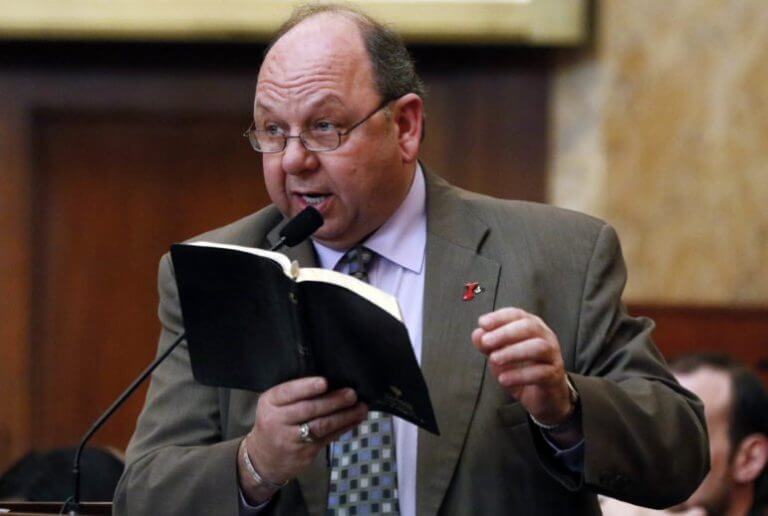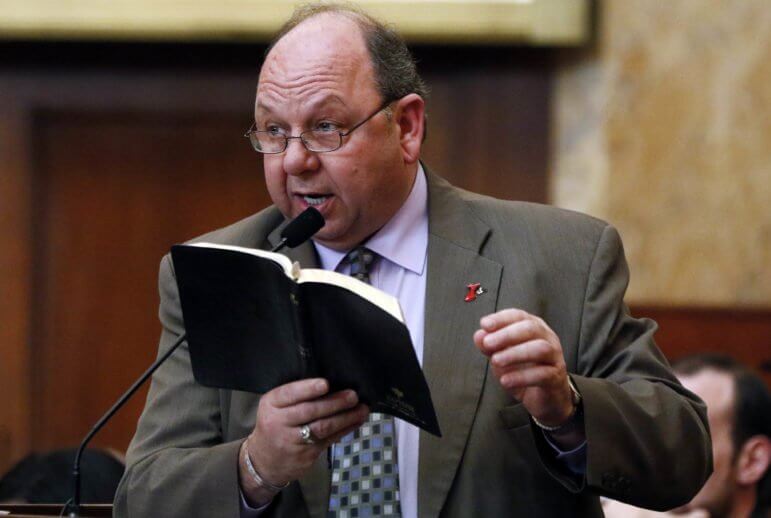

Rogelio V. Solis, AP
Longtime former state Rep. Steve Holland reads a passage from the Bible during floor debate on a Medicaid bill in February 2018. Holland, known for his fiery arguments, often prefaces them with Scripture.
It is not at all uncommon for Mississippi politicians to quote the Bible to bolster their arguments.
Still, it was a little unusual this week when an official with the American Conservative Union, perhaps the nation’s best known conservative advocacy group, and a Democratic state senator turned to the Bible to make their arguments during a legislative hearing regarding proposed bill that would decrease incarceration rates in Mississippi prisons. What made it even more unusual is that they were on the same side of the argument.
The issue of making changes to the criminal justice system to decrease incarceration rates has long been advocated by progressives. But in recent years, the issue has been embraced by many conservatives.
On Tuesday, David Safavian, general counsel for the American Conservative Union, traveled from his home in the Washington, D.C., area to Jackson in the midst of the COVID-19 pandemic to voice support for criminal justice legislation vetoed earlier this year by Gov. Tate Reeves. Safavian helps run the organization that hosts the annual Conservative Political Action Conference, where all the nation’s top conservative politicians speak each year, and that actively supported Reeves last year in his gubernatorial campaign.
Safavian told the lawmakers he recently was sitting in church when he heard his pastor cite Matthew where Jesus was asked, “How many times must I forgive my brother? Seven?” Jesus responded, “No, 77 times.” Safavian said, “I think we know where Jesus would stand on a bill that writes people off and throws them away when they are capable of redemption.” He added his organization’s “conservative principles” contend that “the harm caused by a sentence should never be greater than the harm caused by the underlying crime. Yet that is exactly what Mississippi’s habitual offender law does.”
Still, Safavian conceded the issue of changing sentencing guidelines can be difficult and cause pain for victims’ rights groups and others. That is why many prosecutors and law enforcement oppose the legislation.
When Reeves vetoed the legislation, many argued the bill would allow those convicted to life sentence without parole and sex offenders to be eligible for parole to get out early. But during the hearing this week, both sides agreed that the bill would not do that.
But District Attorney Hal Kittrell of Columbia said the bill still makes those convicted of first and second degree murder, armed carjacking, armed robbery and burglary eligible for parole after serving 50% of their sentence. He said victims were told at sentencing that people convicted of those felonies would not be eligible for parole that early.
State Senate Corrections Chair Juan Barnett, D-Heidelberg, the author of the legislation, asked Kittrell if he was familiar with the book of Acts in the Bible and the Apostle Paul. Kittrell said of course he was.
Barnett then asked if Christ was willing to forgive Paul — a prosecutor of many Christians before his conversion — then why shouldn’t the state of Mississippi be willing to give a degree of leniency to inmates who were no longer deemed by the Parole Board to be a danger to society.
To that, Kittrell and others at the hearing argued too many ex-inmates are getting in trouble again after release and asked why they should be released early. But Barnett contended that not all were getting in trouble again and that some, if given the opportunity, become productive members of society.
Kittrell pointed out that the state garnered $40 million in savings from 2014 legislation that reduced some sentences and made it easier for non-violent offenders to get parole. Those savings, he pointed out, were supposed to go back into the Department of Corrections for programs to help rehabilitation efforts. He said that is not happening.
Barnett said he has not decided whether he will try to override Reeves’ veto if the Legislature, as expected, reconvenes in October. Most concede it would be difficult to garner the two-thirds majority needed to override the veto.
In the meantime, Barnett, House Judiciary B Chair Nick Bain, R-Corinth, and House Correction Chair Kevin Horan, R-Grenada, who convened last week’s joint meeting, say if changes are not made to the prison system, the state could face major costs. The prison system is being investigated by the U.S. Justice Department, and various lawsuits have been filed after violence and riots in the system in late December and early January. There have been more than 50 deaths in the system since December.
They cited neighboring Alabama having to spend more than $1 billion to address issues related to similar lawsuits and Justice Department investigation.
Those costs might be the point where biblical and fiscal issues intersect and could garner more support for legislation easing sentencing guidelines.
The post Left, right find biblical common ground on Mississippi sentencing reform appeared first on Mississippi Today.
- Rising optimism among small and middle market business leaders suggests growth for Jackson - February 24, 2026
- Jackson City Council confirms mayor’s pick of RaShall Brackney as new police chief - February 24, 2026
- Hinds County supervisors bemoan demands on purse strings as public defenders seek better pay - February 24, 2026